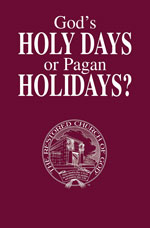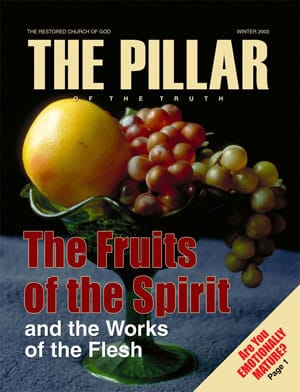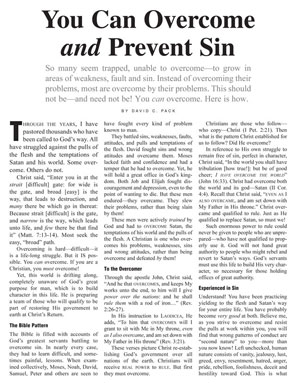Looking at himself in the mirror, the old man had come to understand his deeds and what he truly was. He understood that he was corrupt and carnal, and that he was cut off from God without access to His Holy Spirit. Even more, this old man understood that he had to repent of his past sins, to which he had been enslaved his entire life. If the old man died, he knew that he would be free from sin.
This old man was crucified for his sins.
But, this man lived again and became a new man, through his Savior. He now had to put on righteousness and true holiness. He was required to mortify—destroy—those things within him that were part of his carnal nature, and in turn, build true character.
Do you recognize this person? This person—the old man who became a new man—is every Christian! This old man is specifically mentioned in three separate places in the New Testament. (See Romans 6:6; Ephesians 4:22; Colossians 3:9. Note the context surrounding each scripture.)
While this man was replaced by a new man at baptism, each of these passages explains a process of mortifying—putting to death—aspects of our nature such as “fornication, uncleanness, inordinate affection, evil concupiscence, and covetousness…” (Col. 3:5). They also speak of putting off “anger, wrath, malice, blasphemy, filthy communication (Col. 3:8) and also “the former conversation [way of life]…which is corrupt according to the deceitful lusts” (Eph. 4:22).
The apostle Paul understood the battle against our old carnal self. Even as a great servant of God, he struggled against his flesh. Read his statements in Romans 7:14-23.
Paul, like every Christian today, was battling carnality—warring after the flesh. Our entire Christian lives deal with battling three enemies: Satan, ourselves and society. In this article, we will focus on one-third of that battle—the battle against ourselves.
After baptism, we were still 99.9 percent carnal. The rest of that carnality does not disappear in a week, month, or year. Throughout our physical lives, we must overcome—get rid of—our carnal nature and replace it with true, godly character.
It has been said that terrorism is a very difficult war to wage because it is hard to figure out who the enemy is. You cannot win a war without knowing who you are fighting. Similarly, in order to battle against carnality, we must understand who and what we are up against. God does not leave us hanging—He does not require us to fight and overcome our carnal nature without showing us exactly what we have to fight.
Carnality
At baptism, we were required to prove that God exists, that His Word—the Bible—carries authority, and the location of His Church. Also, during counseling, we went through a list of scriptures that contained term after term for the many elements of carnal nature.
Notice: Adultery, an evil eye, anger, backbiter, blasphemer, boaster, covenant breaker, covetous, debater, deceiver, despiser of those that are good, despiteful, disobedient, disobedient to parents, drunks, emulations, envious, evil concupiscence, evil thoughts, false accuser, fierce, filthy communication, foolish, fornications, hater of God, hating one another, heady, heresies, highminded, idolaters, implacable, incontinent, inordinate affection, inventors of evil things, lasciviousness, lovers of pleasures, lovers of their own selves, maliciousness, malignity, murder, proud, revellings, seditions, serving various lusts and pleasures, sorcerers, strife, thefts, traitors, trucebreakers, unclean, unholy, unmerciful, unrighteousness, unthankful, variance, whisperers, wickedness, witchcraft, without natural affection, without understanding, and finally, wrath.
If you look at all the scriptures combined (Mark 7:21-23; Rom. 1:29-31; Gal. 5:19-21; Col. 3:5-8), there are a great many words that describe carnal, human nature.
When was the last time you truly studied these scriptures? Are they just for those who are not yet baptized? Certainly, not! Ironically, when we read these scriptures containing lists of carnal nature, our own human nature often causes us to just breeze right through them, because we have “heard it all before.”
But we continually battle carnal nature. Christianity is an all-out war. We are required to fight the good fight and battle the flesh.
How many times have we looked at these lists in the Bible and asked ourselves which of these carnal elements are still alive and well, and working within us?
Recall when Christ magnified and fulfilled the Law, at the Sermon on the Mount (Matt. 5:17). He took the time to expand the commandments “Thou shall not kill” (vs. 21-22) and “Thou shall not commit adultery” (vs. 27-28). We should be able to follow Christ's example and apply it to every work of the flesh. Do not just look at the word “adultery” and tell yourself that you certainly are not doing it. Rather, ask yourself, “How, in the slightest form, might this work of the flesh still be present within me?”
This article will only serve as a brief overview of most of the works of the flesh. Each one could form its own article. You can use this overview as a foundation for a more thorough Bible study on self-examination prior to the Passover season.
The works of the flesh can be categorized as either attitudes or actions. Attitudes, of course, inevitably turn into actions.
The Attitudes
The attitudes will be examined first. Remember, this is not an exhaustive list; there are more, but, for lack of space, not all are addressed. Each work of the flesh will be followed by Strong’s Greek number.
Anger (3709): Defined as anger, temper, agitation, and indignation. Often, people lose control when they get angry. Remember, this is an attitude, therefore, you should be aware of the anger you might feel, but not necessarily show.
Covetousness (4124): Found in three different lists, covetousness is something that was repeated for emphasis because it is prevalent in human nature. It is defined as “a greedy desire to have more.”
The word covetous is also found in II Timothy 3:2, but is a different Greek word (Strong’s: 5366), which literally means “lover of money.” The love of money is a “root of all evil” (I Tim. 6:10).
Deceit (1388): Defined by Matthew Henry as: “wickedness covered and disguised, that it may be the more securely and effectually committed.” In the Laodicean age, deceit abounds among God’s people. To be deceived about yourself may be the worst work of the flesh because you are unable to see any other elements of your nature: “The heart is deceitful above all things” (Jer. 17:9).
Emulations (2205): The Greek word here is zelos, which often means “zeal.” Yet, in this context, it has the meaning of jealousy: “an envious and contentious rivalry.” This is a focus on self and an attempt to lower others.
Envy (5355): Defined by Webster’s Dictionary as “Pain, uneasiness, mortification, or discontent, excited by another’s prosperity, accompanied with some degree of hatred or malignity, and often with a desire or an effort to depreciate the person, and with pleasure in seeing him depressed.”
Foolish, foolishness (453, 877): Two different Greeks words, but with very similar—and blunt—meanings. Defined as, “foolishness, folly, senselessness, thoughtlessness, recklessness, not understanding, unwise and unintelligent.” God’s Word is sometimes painfully clear. Are there times when these words describe your actions?
Hateful, hatred (4767, 2189): Hate is on almost every list of the works of the flesh in one form or another. This word is defined as enmity, hostile and detestable. Hatred can be expressed as “the feeling or expression of deep-seated ill will.” Romans 8:7 sums up this attribute of carnal nature: “the carnal mind is enmity against God.” This hatred is magnified to “haters of God” (Rom. 1:30) and “hating one another” (Titus 3:3).
Incontinent (193): Means powerless, without strength and lacking self-control.
Lasciviousness (766): More easily understood as lust. The full definition is broader and includes “unbridled lust, excess, licentiousness, lasciviousness, wantonness, outrageousness, shamelessness and insolence.”
Lovers of their own selves, lovers of pleasures (5369, 5367): The world continues its relentless pursuit of pleasure and certainly continues in its selfish ways, but Christians are to overcome these characteristics. Adam Clarke’s Commentary sums up the meaning of “lovers of pleasures more than lovers of God” (II Tim. 3:4): “Pleasure, sensual gratification, is their god; and this they love and serve; God they do not.”
Malice (2549): The English word is defined as “A desire to harm others or to see others suffer; extreme ill will or spite.” A malicious person desires to injure and show deliberate ill will to others.
Proud (5244): Certainly a great tendency in human nature, pride is simply viewing oneself as above others and “a self-assured estimate of one’s means or merits.” Other closely related words are arrogance and haughtiness. Vincent’s Word Studies explains: “The picture in the word is that of a man with his head held high above others. It is the sin of an uplifted heart against God and man.”
Uncleanness (167): Beyond the physical, this word means “impure motives, unclean in a moral sense: unclean in thought and life.”
The Actions
Following is a list of some of the actions that flow from attitudes of the works of the flesh. This section may be even easier, humanly, to just “give it a once over lightly,” believing you would never be capable of such things. But again, these are things that we must be aware of, understand, and overcome.
Adultery (3430): This work is simply and literally defined as adultery—unlawful sexual relations involving at least one married individual.
Blasphemy (988): Defined as “speaking evil, slanderous, reproachful, railing and abusive,” the English word comes from the Greek word blasphemia. This “speaking evil” is done against both man and God. How often do we find ourselves doing this?
Boasters (213): This is a fruit of pride and is simply proclaiming one’s own goodness, when that should be left to others (Prov. 20:6). A boaster can be defined as an “empty pretender,” which also is founded on vanity, another dangerous attitude.
Debate, variance (2054): Strife, debate, contention, variance, wrangling. As Clarke’s Commentary puts it, “where the principle of hatred proceeds to open acts.” Debating and arguing is directly related to contention and strife, often connected with anger.
Fierce (434): The opposite of mild and gentle. Defined as “not tame, savage, fierce.”
Filthy communication (148): Filthy or vile communication, also defined as “foul speaking and low and obscene speech.” The root of this word is defined as “filthy, baseness, dishonorable.” Within certain contexts, it could also be considered “abusive language.”
Fornication (4202): Translated from the Greek word porneia, from which modern-day pornography derives its name. This word is a much broader term than adultery. It includes any sexual misuse: Adultery, fornication, homosexuality and bestiality. In today’s society, illicit sex is becoming more and more prevalent, causing the temptation and danger of fornication to increase.
Heresies (139): In the Laodicean age, in which the people rule, this is a great test and weakness among God’s people. Heresy is any wrong teaching or false doctrine. One of the definitions of heresy is “disagreement arising from diversity of opinions and aims.” As the age grows darker, there is an ever increasing need for God’s people to be unified in truth.
Idolatry (1495): Defined as the worship of false gods, idolatry is when people ignore Matthew 6:33, and seek and esteem anything more than “the kingdom of God, and His righteousness.”
Seditions (1370): Means “divisions, seditions and dissension.” Notice Paul’s admonition to the Corinthians: “For you are yet carnal: for whereas there is among you envying, and strife, and divisions, are you not carnal, and walk as men?” (I Cor. 3:3). Clarke comments on this divisiveness: “divisions, refers to their conduct; as they could not agree, they contended till they separated from each other, and thus rent the Church of Christ.” Does this sound familiar to today’s situation among God’s people?
Traitors (4273): Those who betray a brother. This was prophesied to happen within God’s Church at the end of the age (Matt. 24:10). Within man’s governments, treason has been considered one of the worst crimes one can commit. God’s people must strive to do the opposite—to be loyal!
Unmerciful (415): Literally means “not merciful, merciless, and destitute of compassion.” God is full of mercy (Psa. 145:8), while mankind—with carnal nature—is the opposite.
Unthankful (884): Defined as “thankless, ungrateful, unthankful, and ungracious.” Regarding this attribute, Clarke’s Commentary states, “Persons without grace, or gracefulness; who think they have a right to the services of all men, yet feel no obligation, and consequently no gratitude.”
Wickedness (4189): At the conclusion of the actions, this word overarches the works of the flesh. It is iniquity (lawlessness), active wickedness, and is personified by evil purposes and desires. Recall, Satan is called the wicked one. Matthew Henry’s Commentary sums it up: “Wickedness is…malice, hatred, and ill-will, a desire to do mischief, and a delight in mischief done.”
“Take Heed”
As Christians, we are all warned, “Wherefore let him that thinks he stands take heed lest he fall” (I Cor. 10:12). As we continue our battle, we must overcome our carnal nature. It is a step-by-step process that will take the rest of our physical lives.
Do not give up; take it one step at a time. Cry out to God to deliver you from your carnal mind, asking Him to show you which works of the flesh still exist within you.
It is a simple process: First, ask God to clear up any blindness or deception that you may have, and show you which works of the flesh you need to overcome.
Second, once you see a work of the flesh, strive to overcome and remove it from your life. Refer to the all-important seven steps in the article “You Can Overcome and Prevent Sin”
Third, as you personally strive to overcome, with the help of God’s Holy Spirit, ask God to deliver you from your weaknesses. As you overcome them, give God thanks, and be prepared for the next time any of these traits try to slip back into your life.
Building godly character is the reason you were born. Remember, to do this, you must mortify and put to death the “old man” and all his characteristics. Then, you can move on to the new man and his characteristics—the fruits of God’s Spirit!

















